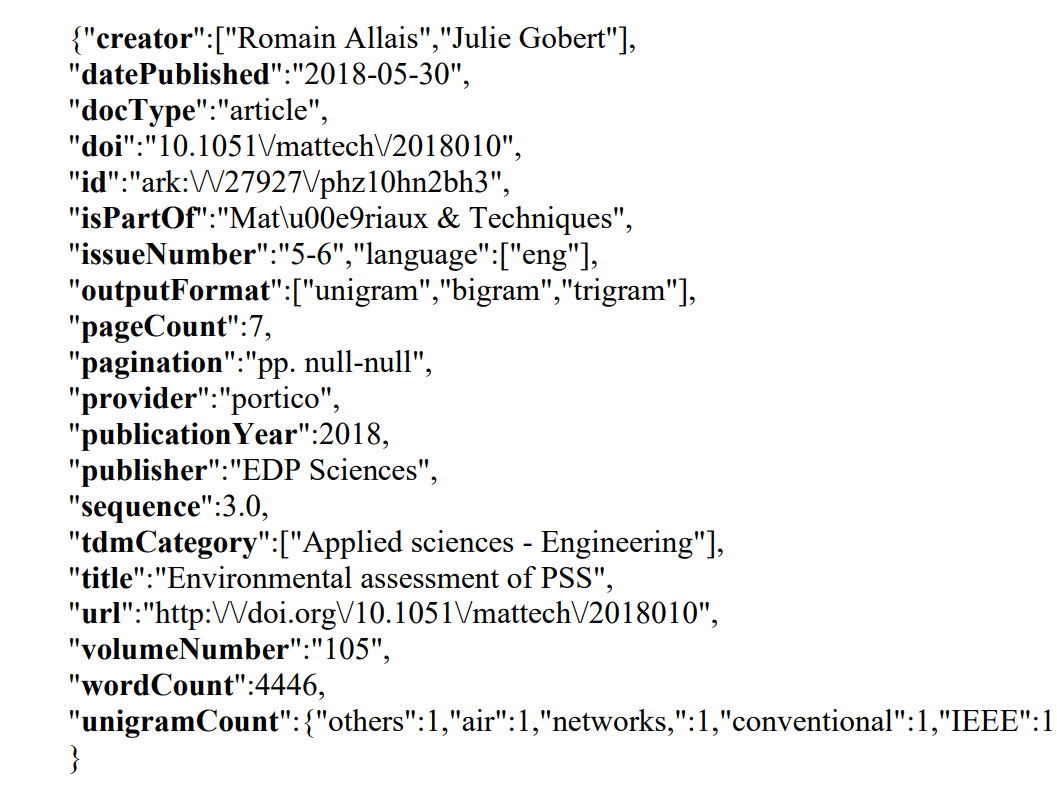C++如何从类似JSON的文本文件中获取特定的值?

我有一个.txt文件,其中包含数百个图书信息。(所显示的图像只是其中之一,它有多行相同的信息,在同一个.txt文件中有不同的数据),我只想检查"unigramCount“值,并找到前3位最常用的单词。因此,程序应该查找unigramCount行中的每个单词,并在单词前面增加数字。将它们存储在数组或链接列表中,最后告诉最频繁的3个单词。
回答 1
Stack Overflow用户
发布于 2022-01-22 18:10:24
您的文件是一个所谓的结构化文本文件,如xml或json。
语法可以定义文件的语言(结构)。如果我们看一下乔姆斯基等级分类,那么我们就有了一种所谓的“上下文无关语言”,它可以并且应该用一个典型的推倒自动机或递归下降分析器来分析。
但你说过你“只想查一查”。这需要一个乔姆斯基等级体系3 规则语法,它可以用正则表达式实现。
请注意:通常不能使用正则表达式,因为它们不能识别嵌套结构。例如。如果有嵌套的开始和结束大括号,则正则表达式无法工作。简单地说。正则表达式不能计数。
无论如何,由于给定文件的简单性,我们可以使用正则表达式进行模式匹配。
好的是C++用它的regex库支持正则表达式。
但即使如此,我们也无法找到一个单一正则表达式的解决方案。我们将采用三个步骤
- 匹配包含unigram数据的所有行。
- 在上面的匹配行上迭代并提取单词/计数对
- 将单词计数对拆分为单词和计数
(正则表达式可以在任何在线regex测试器(如这里)中进行测试)。
如果我们有这个,我们将使用一个关联的容器,就像一个std::地图,如果排序重要,或者地图 (如果速度重要)来计数。命令是为了字数而不是字数。
使用地图或多或少是计数项目的标准方法。“关键”是我们想要计数的词。它是独一无二的。相关的淡水河谷是伯爵。
这两种地图都有一个方便的索引算子。您可以将键(在本例中是一个unigram单词的实例)放在方括号[]中,如果该单词已经存在,则索引运算符将返回对相关值的引用。
如果索引中的单词尚未在映射中出现,它将被创建,并且在我们的示例中将值初始化为0。将再次返回对此值的引用。因此,在任何情况下,结果都是对计数器值的引用,然后我们可以增加这个值。
凉爽的。
但是,由于关联容器的性质,您无法对它们进行排序。因此,我们需要在第二个容器中复制产生的单词/计数对。
并且在CPP算法库中有很好的拟合函数。复制。使用它,我们可以找到前3,并将它们复制到结果的std::vector中。
因此,我们将大量使用现有的和高级的C++功能,用几行代码实现解决方案。
有许多不同的解决方案。一个例子是:
#include <iostream>
#include <fstream>
#include <string>
#include <regex>
#include <unordered_map>
#include <utility>
#include <map>
// ------------------------------------------------------------
// Create aliases. Save typing work and make code more readable
using Pair = std::pair<std::string, unsigned int>;
// Standard approach for counter
//using Counter = std::unordered_map<Pair::first_type, Pair::second_type>;
using Counter = std::map<Pair::first_type, Pair::second_type>;
// Sorted values will be stored in a vector
using Top = std::vector<Pair>;
// ------------------------------------------------------------
// Regexes
const std::regex unigramLineIdentifierRegex{R"(\"unigramCount\":\{(.*)\})"};
const std::regex unigramCountRegex{ R"((\"[a-zA-Z ,]+\"\:\d+)+)" };
const std::regex wordAndCountRegex(R"(\"([a-zA-Z ,]+)\":(\d+))");
int main() {
// Open the file and check, if it could be opened
if (std::ifstream ifs{"text.txt"}; ifs) {
// Read the complete textfile into a string
std::string text(std::istreambuf_iterator<char>(ifs), {});
// Here we will count the words
Counter counter{};
// Now extract all lines containing the unigram line pattern into a std::vector
std::vector unigramLine(std::sregex_token_iterator(text.begin(), text.end(), unigramLineIdentifierRegex), {});
// For each of the found lines containg a unigram record
for (const std::string& wordAndCount : unigramLine) {
// Extract all word count pairs
std::vector unigrams(std::sregex_token_iterator(wordAndCount.begin(), wordAndCount.end(), unigramCountRegex), {});
// Go over all word/count strings and split them up
for (const std::string unigram : unigrams) {
// Find the word part and the count part
std::smatch smWordAndCount{};
if (std::regex_match(unigram, smWordAndCount, wordAndCountRegex)) {
// Increment the global counter
counter[smWordAndCount[1]] += std::stoi(smWordAndCount[2]);
}
}
}
// Here we will store the top 3
Top top(3);
// Copy and sort. Get only the biggest 3
std::partial_sort_copy(counter.begin(), counter.end(), top.begin(), top.end(), [](const Pair& p1, const Pair& p2) { return p1.second > p2.second; });
// Debug output. Show the result´, the top3 on the screen
for (const auto& [word, count] : top)
std::cout << word << " \t--> " << count << '\n';
}
else std::cerr << "\n*** Error: Could not open source file\n\n";
}请记住。regex解决方案不是惯用的正确方法。
如果文件真的是JSON,那么查看这个图书馆
https://stackoverflow.com/questions/70815367
复制相似问题

